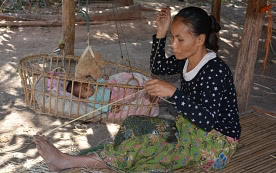WEBINAR: Impacts of COVID-19 on care politics
-
May 19, 2020
- Online @socialprotection.org

Joining Debora Diniz, Brown University / University of Brasilia and Valeria Esquivel, ILO, in a discussion moderated by Shahra Razavi, ILO, Rachel’s participation ensured that informal workers were included in the debate on child care in times of crisis.
The COVID-19 crisis had and will continue to have significant impacts on care work in both the public and private domains. There have been increasing and changing care burdens especially for those working in the care sector, such as healthcare workers and domestic workers. Globally, women make up 70 per cent of workers in the health and social sector (WHO, 2019). In many countries, this work is done by migrant workers under often already precarious conditions.
The closure of schools and childcare facilities meant that children needed to be taken care of at home at a time when households were facing income losses. Some countries have already started adapting their social protection system in order to respond to this new scenario. For example, some countries have implemented care allowances for those who are not able to work because they need to take care of their dependents. In others, families with children received receiving cash transfers, child benefits, childcare vouchers or top-ups through existing programmes.